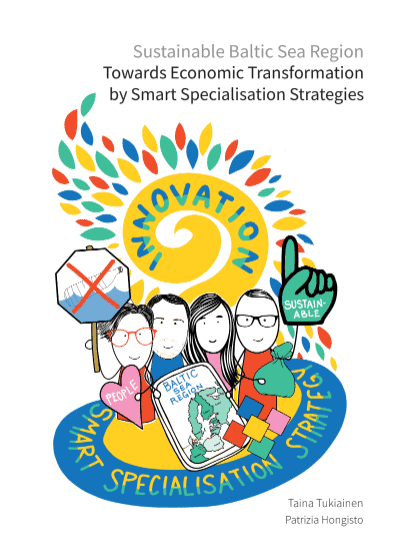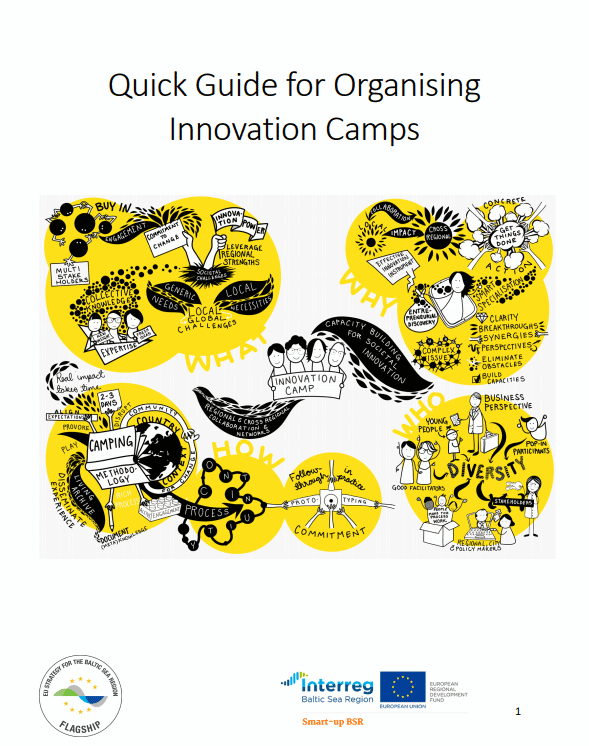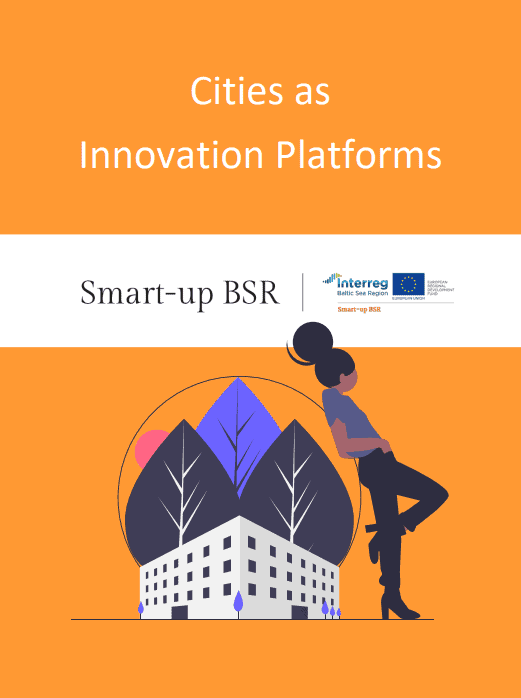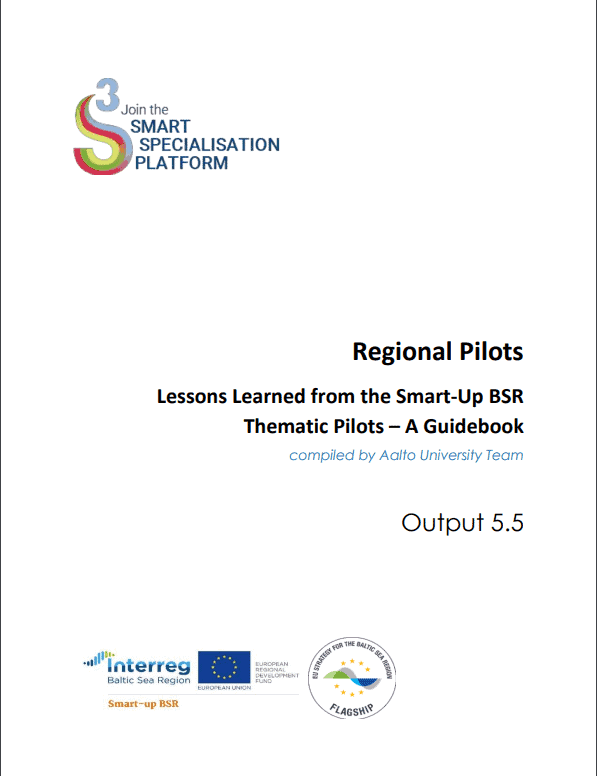Smart-up BSR
Smart specialisation is an innovative approach bringing local authorities, academia, business spheres and the civil society to enhance regional innovation. It enables regions across Europe to identify and develop their own strengths to boost growth and prosperity.
The experience has proved that by applying the smart specialisation approach, innovation and development policies in the Baltic Sea region have contributed to high performance and prosperity on varying grounds, either through science, knowledge and economy, or digitalisation, logistics and harbour developments.
However, inter-regional collaboration, economic transformation and implementing Sustainable Development Goals (SDGs), are not yet a norm in the Baltic Sea region. Many regions lack methods or institutional frameworks to implement smart specialisation successfully.
The Smart-Up BSR project studied how regions work to align their ecosystems with smart specialisation initiatives to ensure the growth of their businesses and the wellbeing of their citizens. It fostered bottom-up regional innovation through peer-to-peer learning and entrepreneurial discovery process in a series of innovation camps.
Budgets
in numbers
-
2.40MillionTotal
-
1.79MillionErdf
-
0.09MillionEni + Russia
-
0.00MillionNorway
Achievements
Engagement for a shared vision
Smart-Up BSR addressed the challenge of making regional research and innovation strategies (RIS3) relevant and effective to a diverse set of stakeholders. It did so by pooling the dispersed knowledge and capabilities together by engaging regional actors, universities, non-governmental organisations (NGOs), politicians, and businesses to create a shared vision of regional development and smart specialisation strategies across the Baltic Sea. Collective vision and strategy development help to create and maintain stakeholder commitment and a sense of ownership.
Innovation camps: networking for a brighter future
Smart-Up BSR organised ten innovation camps to facilitate the interaction between business, academia, civil service organisations, and other NGOs. The camps took place both virtually and onsite in Aarhus (Denmark), Palanga-Klaipeda (Lithuania), Tallinn (Estonia), Brandenburg (Germany), Helsinki-Espoo-Kotka (Finland), Gdansk-Gdynia-Sopot (Poland) and Riga (Latvia).
The concept was specifically designed to increase innovativeness and be a major learning instrument. The camps generated bottom-up and needs-driven innovation, providing an opportunity for co-creation, experimenting, and building trans-regional networks for more effective RIS3 implementation in the Baltic Sea region.
Cooperating across borders on smart solutions
During the innovation camps, participants addressed challenges for promoting regional smart specialisation put forward by cities, regions, universities, NGOs, and businesses across the Baltic Sea. Additionally, experts from the Committee of the Regions and EU Joint Research Centre advised participants on how to advance innovative solutions to those challenges.
The involved organisations developed and prototyped different pilots for each of the chosen thematic content areas: active healthy ageing, smart cities, climate change, and circular economy. Thanks to the better conditions to cooperate in innovation and entrepreneurship activities, regions across the Baltic Sea have enhanced their capacity to practice smart specialisation approaches.
For instance, the Aarhus pilot centred around establishing a regional GovTech Center for municipalities. This trans-regional initiative helped municipalities explore, test, and implement emerging technologies.
Another successful example is the pilot in Latvia. In this case, the University of Latvia initiated cooperation with the Riga City Council on the theme of a smart city. The partners developed the “Green University” concept for the horizontal environment and sustainability-related projects aiming at climate neutrality.
Outputs
Book on smart specialisation strategy implementation in the region

Quick Guide for Organising Innovation Camps

Leaflet about the Cities as Innovation Platforms

Guidebook on Regional Pilots

Project Stories
Partners
Aalto University Foundation sr
- TownAalto
- RegionHelsinki-Uusimaa
- CountryFinland
- RepresentativeTaina Tukiainen
- Phone
- E-Mail
- Web
Helsinki-Uusimaa Regional Council
- TownHelsinki
- RegionHelsinki-Uusimaa
- CountryFinland
- RepresentativeKristiina Heiniemi-Pulkkinen
- Phone
- E-Mail
- Web
The City of Aarhus
- TownAarhus
- RegionØstjylland
- CountryDenmark
- RepresentativeLouise Overgaard
- Phone
- E-Mail
- Web
Tallinn City Enterprise Department
- TownTallinn
- RegionPõhja-Eesti
- CountryEstonia
- RepresentativeJaanus Vahesalu
- Phone
- E-Mail
- Web
Brandenburg Ministry of Justice , European Affairs and Consumer Protection
- TownPotsdam
- RegionBrandenburg an der Havel, Kreisfreie Stadt
- CountryGermany
- RepresentativeAnne Weingart
- Phone
- E-Mail
- Web
University of Latvia
- TownRiga
- RegionRīga
- CountryLatvia
- RepresentativeGunta Raca
- Phone
- E-Mail
- Web
Liepaja University
- TownLiepaja
- RegionKurzeme
- CountryLatvia
- RepresentativeInga Vasermane
- Phone
- E-Mail
- Web
The Agency for Science, Innovation and Technology
- TownVilnius
- RegionVilniaus apskritis
- CountryLithuania
- RepresentativeRičardas Valančiauskas
- Phone
- E-Mail
- Web
Klaipeda Science and Technology Park
- TownKlaipeda
- RegionKlaipėdos apskritis
- CountryLithuania
- RepresentativeAndrius Sutnikas
- Phone
- E-Mail
- Web
Metropolitan Area Gdańsk-Gdynia-Sopot
- TownGdańsk
- RegionTrójmiejski
- CountryPoland
- RepresentativeAgata Blacharska
- Phone
- E-Mail
- Web
ITMO University
- TownSt.Petersburg
- RegionCity of St. Petersburg
- Country
- RepresentativeSvetlana Bazueva
- Phone
- E-Mail
- Web
Cursor Oy, Kotka-Hamina Regional Development Company
- TownKotka
- RegionKymenlaakso
- CountryFinland
- RepresentativeMarja Holopainen
- Phone
- E-Mail
- Web
Ministry of Education and Science of the Republic of Latvia
- TownRiga
- RegionRīga
- CountryLatvia
- RepresentativeRonalds Štrauhs
- Phone
- E-Mail
- Web
-
Project managerTaina TukiainenAalto University
-
Legal representativeIngmar BjörkmanAalto University Foundation sr
-
Financial managerTuija HeikuraAalto University
-
Communication managerAngelina KorsunovaAalto University



